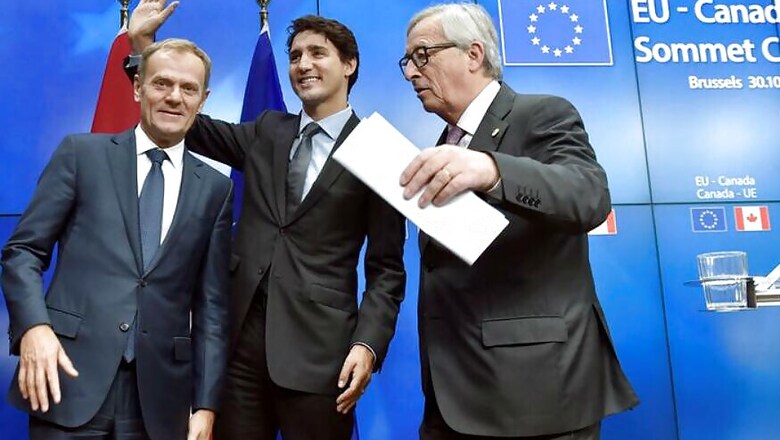
views
Brussels: Canadian Prime Minister Justin Trudeau and European Union leaders on Sunday finally signed a landmark trade deal seven years in the making, after it was nearly being torpedoed by a small region of Belgium.
The ceremony in Brussels had been pushed back from Thursday after French-speaking Wallonia, with just 3.6 million people, initially vetoed an agreement affecting more than 500 million Europeans and 35 million Canadians.
Protesters earlier burst through riot police lines and hurled red paint at the European Union's headquarters, while activists banged drums and chanted slogans against the Comprehensive Economic and Trade Agreement (CETA).
"Well done, well done," Trudeau said as he hugged and kissed Tusk and Juncker on his arrival amid tight security.
"Things were difficult but we managed to succeed in the end."
"What patience," replied Juncker, adding: "This is an important day for the EU and for Canada too because we are setting an international standard that will have to be followed by others."
The start of Sunday’s summit was further delayed when Trudeau's plane was briefly forced to turn back due to mechanical problems, capping two weeks of chaos over what was meant to be a symbolic sign-off.
CETA removes 99 per cent of customs duties between the two sides, linking the single EU market with the world's 10th largest economy.
The Belgian drama had sparked dire warnings for the EU's credibility as a trading partner as it wrestles with Britain's shock vote to leave, a huge migration crisis and the threat of a resurgent Russia.
After years of negotiations the deal almost collapsed, with Trudeau only agreeing late Friday to fly to Brussels after Wallonia finally agreed to join the rest of Belgium and the other 27 EU member states in approving the deal.
The pact required all EU member states to endorse it and in some cases such as Belgium's for regional governments to agree too, giving tiny Wallonia an effective veto.
The Walloons had for two weeks resisted huge pressure from all sides until it won concessions for regional farming interests and guarantees that international investors will not be able to force governments to change laws.
The concerns in the declining industrialised region in Belgium's south reflected wider concerns in Europe about globalisation, as well as fears among activists that such deals erode consumer, social and environmental protections.




















Comments
0 comment